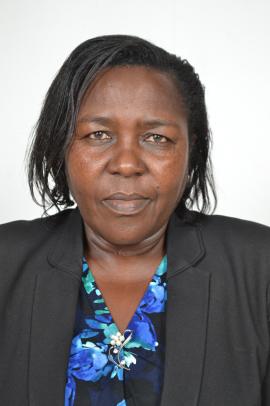Naomi works with the projects on the Human Development related organization at the management level, where she coordinates project management activities and project financial resources for the Consolata Missionaries within Kenya-Uganda Region.
Over 10 years she works in the field of project and planning management. She mobilizes and facilitate the funding process of the projects for the organization of Consolata Missionaries in Kenya-Uganda Region. She identifies needs from the community within Kenya-Uganda Missions. She writes projects proposals and look for the possible donors and financiers, she act as link point between the beneficiary missions and donors, financiers. She monitor/supervise and evaluate all the funded projects within the Kenya-Uganda Region. She prepares final reports of both narrative and financial of all financed projects.
She holds a Bachelor of Arts Degree in Social Ministry in Human development from the Catholic University of Eastern Africa.
Naomi will be awarded a Degree of Master of Arts in Project Planning and Management of the University of Nairobi.

Topic
Influence of Women Empowerment Project on Enhancement of Food Security in Mbeere Sub-Counties, Embu County, Kenya
Abstract
Women empowerment is a primary component in the Sustainable Development Goals (SDGs) that has received massive attention in international development. Globally, it is also a crucial aspect of the third Millennium Development Goal that emphasizes on promoting gender equality and the empowerment of women. To enhance food security within any society, economic participation and empowerment of women remain fundamental to strengthening their rights and enabling them to have control over productive resources. Whereas academicians agree that steps leading to empowering women have been studied, the rate and enhancement of food security have fallen short of expectations in the developing world. This study, therefore, aimed to address the influence of women empowerment projects on the enhancement of food security in Mbeere Sub-Counties, Embu County. The study was anchored on the following objectives: level of women education influence on the enhancement of food security in Mbeere Sub-Counties, Embu County, the credit availability influence on the enhancement of food security in Mbeere Sub-Counties, Embu County, the building capacity of women influence on the enhancement of food security in Mbeere Sub-Counties. The theories that were adopted include the Theory of Change and the Critical Social Theory. A descriptive survey research design was adopted across a target population of 8,000 women comprising of women in the socio-economic empowerment program and women in administration in eight wards in Mbeere Sub-Counties, Embu County. A sample of 400 women was sampled to take part in the study. Questionnaires and interview guides were used as crucial data collection tools in the study. Both quantitative and qualitative data analysis approaches were used to analyze the collected data as per the research questions. Coding data and data analysis was done using Version 21 of the Statistical Package for the Social Sciences (SPSS). Quantitative data was summarized and results were presented in percentages and frequencies. Analysis of Qualitative data entailed categorizing them into themes and discussion of responses as per each item of study objectives. The study found the level of women education, credit availability, and building capacity has a significant influence on the enhancement of food security in Mbeere Sub-County, Mbeere County. The study concluded that, there is a need to study other aspects of women empowerment other than the level of women education, credit availability, building capacity which influence the enhancement of food security, is also suggested to gain a deeper understanding of its role in the enhancement of food security in the Mbeere Sub-Counties, Embu County.





